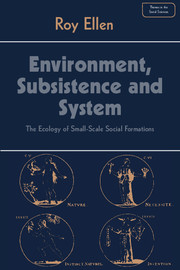Book contents
- Frontmatter
- Contents
- Preface
- Acknowledgements
- 1 ENVIRONMENTAL DETERMINISM AND CAUSAL CORRELATION
- 2 POSSIBILISM AND LIMITING FACTORS
- 3 CULTURAL ECOLOGY AND THE EXPLANATORY IMPERATIVE
- 4 HUMAN ECOLOGY AND THE BIOLOGICAL MODEL
- 5 THE FLOW OF ENERGY AND MATERIALS
- 6 ECOSYSTEMS AND SUBSISTENCE PATTERNS I
- 7 ECOSYSTEMS AND SUBSISTENCE PATTERNS II
- 8 SYSTEMS AND THEIR REGULATION
- 9 INFORMATION AND THE MANIPULATION OF THE ENVIRONMENT
- 10 ADAPTATION: A SUMMARY AND RECONSIDERATION
- 11 THE REPRODUCTION AND EVOLUTION OF SOCIAL AND ECOLOGICAL SYSTEMS
- 12 ECOLOGY IN ANTHROPOLOGICAL METHOD AND THEORY
- Notes
- Bibliography
- Name Index
- Subject Index
2 - POSSIBILISM AND LIMITING FACTORS
Published online by Cambridge University Press: 05 June 2012
- Frontmatter
- Contents
- Preface
- Acknowledgements
- 1 ENVIRONMENTAL DETERMINISM AND CAUSAL CORRELATION
- 2 POSSIBILISM AND LIMITING FACTORS
- 3 CULTURAL ECOLOGY AND THE EXPLANATORY IMPERATIVE
- 4 HUMAN ECOLOGY AND THE BIOLOGICAL MODEL
- 5 THE FLOW OF ENERGY AND MATERIALS
- 6 ECOSYSTEMS AND SUBSISTENCE PATTERNS I
- 7 ECOSYSTEMS AND SUBSISTENCE PATTERNS II
- 8 SYSTEMS AND THEIR REGULATION
- 9 INFORMATION AND THE MANIPULATION OF THE ENVIRONMENT
- 10 ADAPTATION: A SUMMARY AND RECONSIDERATION
- 11 THE REPRODUCTION AND EVOLUTION OF SOCIAL AND ECOLOGICAL SYSTEMS
- 12 ECOLOGY IN ANTHROPOLOGICAL METHOD AND THEORY
- Notes
- Bibliography
- Name Index
- Subject Index
Summary
POSSIBILISM
In the United States, Germany and Russia environmentalism had a deep impact on the study of human ecological relations. But, as is somehow inevitable with grand theoretical generalizations, later students (while acknowledging the source of their inspiration) came to be suspicious of the all-embracing claims it made. Wissler, despite his work on cultural areas and admitted debt to Ratzel, could not be persuaded to accept wholeheartedly the positive formative effect of the environment. For him, the environment was a passive limiting agency rather than a causal factor (Wissler 1929:339). The environment set limits but did not determine. It was this negative formulation of geographical determinism, possibilism, which was to influence much future work.
It is fruitless to locate the precise intellectual origins of possibilism since it must have existed for as long as speculation on human interaction with the environment. An early geographical version is found in the work of Vidal de la Blache (1902); and in Soviet writings of the Stalinist period we find the supreme example of ideological and scientific expression of anti-environmentalism (Matley 1972:114, 119). The response among anthropologists came a little later. In part it reflected theoretical weaknesses within the environmentalist tradition, but was also the product of historical particularism, sociological functionalism, the conduct of ethnographic fieldwork, and an increasing appreciation of the degree to which the environment had been modified by Homo sapiens.
- Type
- Chapter
- Information
- Environment, Subsistence and SystemThe Ecology of Small-Scale Social Formations, pp. 21 - 51Publisher: Cambridge University PressPrint publication year: 1982
- 1
- Cited by



